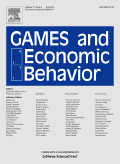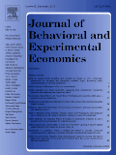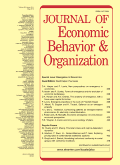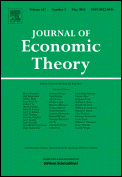
GAMES AND ECONOMIC BEHAVIOR
Scope & Guideline
Advancing Understanding of Strategic Economic Behavior
Introduction
Aims and Scopes
- Game Theory Applications:
The journal publishes research that applies game theory to diverse economic scenarios, including auctions, bargaining, and market design, providing insights into strategic behavior. - Experimental Economics:
A significant portion of the journal's content involves experimental studies that explore human behavior in strategic settings, allowing for empirical validation of theoretical models. - Mechanism Design:
Research often focuses on designing mechanisms that achieve desired outcomes in situations with strategic interaction, emphasizing efficiency, fairness, and incentive compatibility. - Social Preferences and Norms:
The journal examines how social preferences and norms impact economic decisions, incorporating aspects such as fairness, cooperation, and punishment in strategic interactions. - Information Economics:
Many studies investigate the role of information in economic behavior, including topics like information disclosure, signaling, and the effects of private information on decision-making.
Trending and Emerging
- Behavioral Game Theory:
An increasing number of studies are focusing on how psychological factors influence decision-making in strategic contexts, integrating behavioral insights into traditional game theory. - Network Games and Social Dynamics:
Emerging research is exploring how networks and social dynamics affect strategic interactions, particularly in markets and collective decision-making scenarios. - Environmental and Resource Economics:
There is a notable rise in studies addressing environmental issues and resource allocation, reflecting global concerns about sustainability and strategic behavior in ecological contexts. - Machine Learning and AI in Economic Behavior:
The incorporation of machine learning and AI techniques into game theory research is gaining traction, with studies investigating their effects on strategic decision-making and market dynamics. - Interdisciplinary Approaches:
An increasing trend towards interdisciplinary research is evident, with studies drawing from psychology, sociology, and political science to enrich the understanding of economic behavior in games.
Declining or Waning
- Traditional Game Theory Models:
There seems to be a waning interest in classical models of game theory that do not incorporate behavioral insights, as newer studies focus more on experimental and applied perspectives. - Single-Agent Decision-Making:
Research centered on individual decision-making processes in isolation is less frequently published, with a noticeable shift towards understanding strategic interactions in multi-agent settings. - Static Equilibrium Analysis:
The emphasis on static equilibrium concepts is declining, with more research devoted to dynamic models that account for time, learning, and adaptation in strategic contexts. - Overly Abstract Models:
There is a reduction in the publication of highly abstract models that lack empirical relevance, as the journal increasingly favors studies that connect theory with real-world applications.
Similar Journals

International Game Theory Review
Bridging Disciplines Through Game TheoryInternational Game Theory Review, published by World Scientific Publishing Co. Pte Ltd, serves as a vital platform for scholars and practitioners interested in the interdisciplinary domain of game theory and its applications across multiple fields including business, computer science, and statistics. With an ISSN of 0219-1989 and an E-ISSN of 1793-6675, this journal features innovative research and theoretical advancements that analyze strategic interactions among rational decision-makers. Despite its current positioning in the Q4 category across various quartiles for 2023, the journal is rapidly evolving, contributing to the global discourse in game theory and its varied applications. As it continues to publish cutting-edge articles until 2024, the International Game Theory Review remains a critical resource for researchers, professionals, and students aiming to enhance their understanding of strategic decision-making frameworks. Stay updated with access options via the publisher's website for the latest research findings that shape the future of this dynamic field.

EXPERIMENTAL ECONOMICS
Advancing economic insights through experimental inquiry.EXPERIMENTAL ECONOMICS is a leading journal dedicated to the advancement of knowledge in the field of economic experimentation and behavioral finance. Published by SPRINGER, this esteemed journal plays a pivotal role in disseminating high-quality research that explores the intersection of economics and experimental methodology. With an impressive Q1 ranking in the category of Economics, Econometrics and Finance (miscellaneous) and a Scopus rank of #52 out of 242, it stands out as a premier outlet for innovative scholarship. Although it operates under a subscription model, the journal is committed to providing its readership with insights into rigorous experimental designs and their applications in economic theory and practice. Researchers and practitioners alike can benefit from its extensive array of studies, contributing to the ongoing dialogue and development within the economic landscape. Covering a scope that converges from 2003 to 2024, EXPERIMENTAL ECONOMICS is not just a repository of knowledge but a catalyst for new ideas, thereby inviting professionals, students, and scholars to engage with cutting-edge research that shapes the future of economics.

ECONOMETRICA
Shaping the future of economic research.ECONOMETRICA, published by Wiley, is a leading journal in the field of economics and econometrics, renowned for its rigorous and cutting-edge research contributions. With an ISSN of 0012-9682 and an E-ISSN of 1468-0262, this esteemed journal holds a prestigious position in the academic landscape, classified in the top quartile (Q1) for both Economics and Econometrics as of 2023, and ranked 42 out of 716 in its field, placing it in the 94th percentile according to Scopus metrics. The journal's scope encompasses a diverse range of topics aimed at advancing economic theory and its practical applications, making it an essential resource for scholars, practitioners, and students alike. Although it operates under a subscription model, the depth and quality of research published in ECONOMETRICA underscore its significance as a cornerstone for intellectual discourse and innovation within the field. Based in the United Kingdom, at 111 River St, Hoboken, NJ 07030-5774, ECONOMETRICA continues to attract high-caliber contributions that shape the future of econometric research.

Journal of Behavioral and Experimental Economics
Illuminating the Complexities of Economic ChoicesWelcome to the Journal of Behavioral and Experimental Economics, a prominent publication founded by Elsevier Science Inc., dedicated to advancing research at the intersection of behavioral science and economics. With a focus on innovative methodologies and experimental frameworks, this journal addresses critical questions surrounding human decision-making, social interactions, and economic behaviors. It boasts a robust impact within its scope, achieving a Q2 ranking in both Applied Psychology and Economics and Econometrics, as well as a Q1 ranking in Social Sciences (miscellaneous) for the year 2023. The journal is accessible through various open access options, making cutting-edge research widely available to a global audience. With a commitment to publishing high-quality studies, the Journal of Behavioral and Experimental Economics serves as an essential resource for researchers, professionals, and students eager to explore the complexities of economic behavior in today’s society.

Economics and Business Letters
Fostering dialogue in the realms of business and economics.Economics and Business Letters is a distinguished academic journal published by UNIV OVIEDO, based in Spain. With a focus on the fields of business and international management as well as economics, econometrics, and finance, this journal plays a pivotal role in disseminating high-quality research and insightful perspectives that contribute to the ongoing discourse in these disciplines. The journal maintains an accessible platform for researchers, professionals, and students alike, enhancing knowledge through its rigorous peer-review process. With an impact factor indicative of its growing influence, it is categorized in the Q3 quartile for both Business and International Management and Economics, Econometrics and Finance in 2023. Since its inception in 2017, Economics and Business Letters has established itself as a vital resource for those seeking to explore the dynamic interrelations between economics and business in our globalized world. Researchers are encouraged to take advantage of this platform to publish their findings and engage with a community dedicated to advancing scholarship in these critical fields.

JOURNAL OF ECONOMIC BEHAVIOR & ORGANIZATION
Advancing Insights into Economic Decision-MakingJOURNAL OF ECONOMIC BEHAVIOR & ORGANIZATION, published by Elsevier, stands as a pivotal platform at the intersection of economics, organizational behavior, and human resource management. Established in 1980 and continuing its impactful contribution to scholarship, this journal holds a prestigious Q1 ranking in both its primary categories for 2023, signifying its significance in advancing research in these fields. The journal’s rigorous peer-review process ensures the publication of high-quality articles that delve into the complexities of economic decision-making and organizational dynamics. Researchers and practitioners alike benefit from its comprehensive analyses and innovative insights, making it an essential resource for those seeking to understand the intricate interplay between economic behavior and organizational structures. With its wide-reaching implications and adherence to excellence, the JOURNAL OF ECONOMIC BEHAVIOR & ORGANIZATION is poised to continue shaping the landscape of economic and organizational research through 2024 and beyond.

SOCIAL CHOICE AND WELFARE
Fostering Knowledge in Economics and Social WelfareSOCIAL CHOICE AND WELFARE is a prestigious academic journal published by Springer, dedicated to advancing the field of social choice theory and welfare economics. With its foundation dating back to 1984, the journal has made significant contributions to theoretical and applied research, becoming a leading platform for the dissemination of innovative ideas. It holds an impressive categorization in 2023, ranking in Q2 for Economics and Econometrics and Q1 for miscellaneous Social Sciences, reflecting its dual impact across these vital disciplines. The journal's Scopus ranking further highlights its influence, situated within the 57th percentile in Social Sciences (miscellaneous) and the 34th percentile in Economics, Econometrics, and Finance. Researchers, professionals, and students can access a wealth of knowledge without open access barriers, as it combines rigorous peer-reviewed articles with important theoretical developments. Its contribution to understanding societal preferences and resource allocation makes it an essential read for those engaged in economic and social research.

THEORY AND DECISION
Empowering Scholars to Navigate the Landscape of KnowledgeTHEORY AND DECISION is a prestigious academic journal published by SPRINGER, which has been a cornerstone of interdisciplinary research since its inception in 1970. With an ISSN of 0040-5833 and an E-ISSN of 1573-7187, this journal offers valuable insights into a range of fields, including Applied Psychology, Decision Sciences, Economics, and more. Holding a remarkable position within various quartile rankings, such as Q1 in Arts and Humanities and Q2 in Economics, it signifies the journal's impact and relevance in modern academic discourse. Although not presently open access, it remains accessible to researchers and institutions that prioritize impactful studies and theoretical advancements. The journal's objectives include exploring decision-making processes and theoretical underpinnings that inform practical applications across disciplines, making it an essential resource for academics, professionals, and students dedicated to advancing knowledge in their respective fields. THEORY AND DECISION continues to shape the landscape of interdisciplinary research, providing a platform for innovative ideas and discussions that are crucial in today’s complex world.

B E Journal of Theoretical Economics
Bridging diverse theories for a comprehensive economic understanding.The B E Journal of Theoretical Economics, published by WALTER DE GRUYTER GMBH, is a prominent academic journal based in Germany, dedicated to advancing research in the field of theoretical economics. With an ISSN of 2194-6124 and an E-ISSN of 1935-1704, this journal has been a valuable resource for scholars since its inception. Recognized for its contributions to the economics domain, it holds a Q3 ranking in the Economics, Econometrics and Finance category as of 2023, positioning it among noteworthy publications within the discipline. Although the journal operates under a traditional publishing model rather than open access, it remains committed to disseminating high-quality theoretical research and fostering scholarly discussions that bridge various economic theories and applications. Researchers, professionals, and students looking to deepen their understanding of economic theory will find a wealth of insights and innovative perspectives within the journal's pages, which have been published with a focus on evolving theoretical frameworks from 2001 to 2003 and again since 2007 through 2024.

JOURNAL OF ECONOMIC THEORY
Elevating Understanding of Complex Economic ModelsThe JOURNAL OF ECONOMIC THEORY, published by Academic Press Inc Elsevier Science, stands as a paramount platform for disseminating groundbreaking research within the field of economics and econometrics. With an impressive history dating back to 1969 and a convergence period extending to 2024, this journal has continually shaped the academic discourse around critical economic theories and methodologies. Currently recognized in the top quartile (Q1) of its category for 2023, it ranks prominently among its peers, boasting an impactful scholarly contribution reflected in its Scopus ranking—positioned at #348 out of 716 journals in the domain. Although it does not offer Open Access, the journal provides an essential resource for those seeking to enhance their understanding of complex economic models and strategies. Researchers, professionals, and students alike will find the JOURNAL OF ECONOMIC THEORY to be an invaluable asset for their academic and professional pursuits in the rapidly evolving landscape of economics.